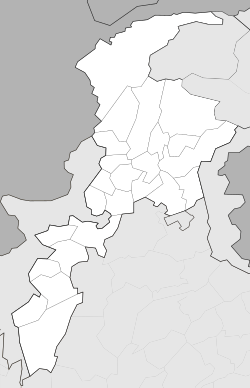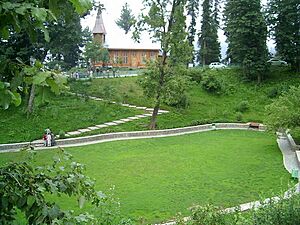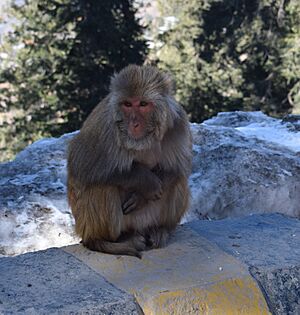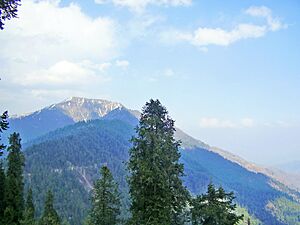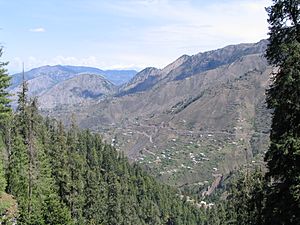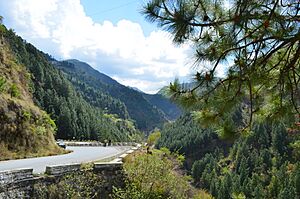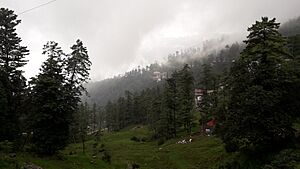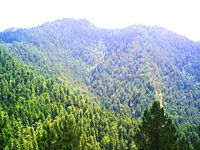Nathia Gali facts for kids
Quick facts for kids
Nathoka Gali
نتھوکا گلی
|
|
|---|---|
|
Hill station
|
|
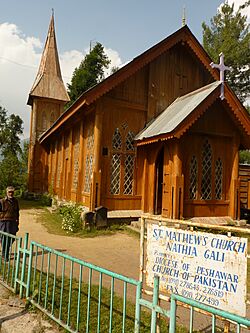
Nathia Gali's St. Matthew's Church, which was built during British colonial rule, photographed in 2014
|
|
| Country | |
| Province | |
| District | Abbottabad District |
| Tehsil | Abbottabad Tehsil |
| Elevation | 2,410 m (7,910 ft) |
| Time zone | UTC+5:00 (Pakistan Standard Time) |
Nathia Gali or Nathiagali (Urdu: نتھیا گلی) is a cool hill station and mountain resort town in Abbottabad District, Khyber Pakhtunkhwa, Pakistan. It sits in the middle of the Galyat mountain range, which has many other hill stations. Nathia Gali is famous for its amazing views, fun hiking trails, and cool weather. It is much cooler than other places in Galyat because it is higher up. The town is about 32 kilometres (20 mi) from both Murree and Abbottabad.
Contents
A Glimpse into History
During the time of British rule, Nathia Gali was an important place. It served as the summer home for the main official of the Peshawar area. The town was managed under special rules for towns back then.
Weather Wonders
The weather in Nathia Gali is usually cool and pleasant. In summer (May to August), it is often foggy. During the monsoon season (July to September), it rains almost every day. As autumn arrives, cool winds make the temperatures drop.
Winters (November to February) are very cold. Heavy snowfall can happen in December and January. The weather stays cool throughout the spring. The most comfortable time to visit is during the summer. Nathia Gali gets a lot of rain every year, between 1,650 millimetres (65 in) and 1,850 millimetres (73 in). In winter, temperatures can go below −10 °C (14 °F), while in summer they can reach over 30 °C (86 °F).
Getting Around
Nathia Gali is connected to Abbottabad and Murree by the Nathia Gali road. You can find public transport like buses and vans that run daily from Abbottabad and Rawalpindi to Nathia Gali.
Sometimes, in December and January, heavy snow can fall. This might block the road to Nathia Gali for a short time.
Fun Things to Do
Nathia Gali is a popular place for tourists in the summer. It is located at 2,410 metres (7,910 ft) above sea level. The area is covered with beautiful forests of pine, cedar, oak, walnut, and other broad-leaved trees.
Many tourists enjoy Nathia Gali in the summer. It's not as crowded as Murree, which is only an hour away, but it offers many fun activities. Nathia Gali is known for its hiking trail that goes to Thandiani, passing through Dagri Naka.
Ayubia National Park is another great spot nearby. Tourists and nature lovers often visit this park.
The Nathia Gali Bazaar has many local crafts and products. You can find traditional shawls, scarves, embroidered fabrics, and handmade jewelry. It's a great place to find unique souvenirs.
Beautiful Views
The natural scenery in Nathia Gali is truly amazing. It is famous for its green meadows and thick forests of oak, cedar, and pine trees. In winter, the snowfall makes the scenery even more magical.
Nathia Gali has a church called St. Matthew's. It was built during the British period and is made entirely of wood. The church is located on the edge of a mountain, offering a lovely view towards Kashmir.
There is also a small bazaar in Nathia Gali. Mukshpuri and Miranjani are two tall peaks nearby. On a clear day, you might even see Nanga Parbat far away in the distance.
Amazing Wildlife
Nathia Gali is home to many different animals, including birds, insects, butterflies, and rhesus monkeys. The World Wildlife Fund has an office in the Galyat area. They have helped bring back the common hill leopard to the forests of Ayubia National Park, which is near Dunga Gali and Nathia Gali. This area is a good home for them. These leopards are very shy and are rarely seen.
Local Communities
The main group of people living in Nathia Gali are the Karlal. There are also some Dhunds, who now call themselves 'Dhund-Abbasis'. The local people are related to those in other parts of Galyat and speak Hindko. In the past, many people had simple lives because there were not many jobs or schools nearby. They often had to go to cities like Rawalpindi or Lahore for work and education. However, with new developments, many now work in tourism or other jobs in the Abbottabad area.
Gallery
 | James Van Der Zee |
 | Alma Thomas |
 | Ellis Wilson |
 | Margaret Taylor-Burroughs |


